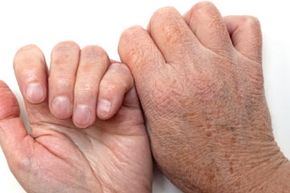You feel that first itchy prickle and start scratching. Before you know it, you're frantically raking at the persistent irritation beneath your skin, trying to get some relief. It's a problem that a lot of people face, but the good news is that there are several simple remedies for dry, itchy skin.
The reason you can't stop itching is that dry skin is cranky skin. That itch tells you that your skin is irritated, and you need to do something about it [source: Cleveland Clinic]. Skin becomes dry when the natural oils that keep it moist and supple have gone missing. Generally, you are most likely to get dry skin on your legs -- specifically your shins and thighs -- and on your arms and the sides of your midriff [source: Medline Plus]. Dry skin can vary in appearance and texture, but it most likely will look parched, rough, flaky, red, peeling, scaly or cracked. It can also feel tight and, of course, itchy [source: Mayo Clinic].
Advertisement
Usually, with a few small steps, you can prevent or treat dry, itchy skin yourself. However, if dryness and itching persist, you should consult a doctor. You should also consider seeing a doctor if the irritation from dry skin becomes severe, if you develop a rash, or if your scratching has led to cuts and sores. These could be signs of a more serious issue, such as seborrheic dermatitis, allergic contact dermatitis or atopic dermatitis, instead of just dry skin [source: Cleveland Clinic].
If you've looked over your dry patches and feel certain that you have everyday dry skin, then you can try eradicating that itch on your own. Read on to learn more about what's making you itch and how to handle it.
Advertisement

